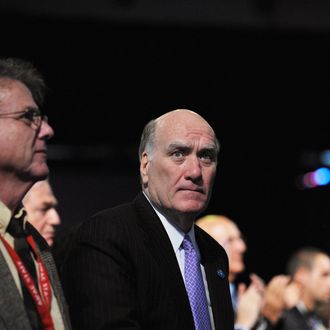
Hiring Bill Daley as chief of staff may not have been the biggest mistake of President Obama’s first term, but it was surely the most obvious one. Now he appears to be reversing it. The official line is that Daley is not being demoted, he is merely handing off more of the day-to-day responsibilities of managing the presidency to Pete Rouse. But, of course, managing the day-to-day traffic in the White House is the entire source of the chief of staff’s power. All accounts suggest Daley performed the mechanics of his job in a catastrophically bad way.
But the interesting legacy of Daley’s tenure is not his mechanical performance. It’s that he conducted an experiment based on the Washington elite view of the Obama presidency. That view, shared by business leaders, centrist pundits, and other elites, holds that Obama’s main problem has been excessive partisanship, liberalism in general, and hostility to business in particular. In December, 2009, Bill Daley wrote a Washington Post op-ed endorsing precisely this analysis. After the midterm elections, Obama – pelted by Daley-esque complaints – appointed Daley chief of staff. “His moderate views and Wall Street credentials make him an unexpected choice for a president who has railed against corporate irresponsibility,” reported the Post. Republicans like Mitch McConnell, Karl Rove, and FedEx CEO Fred Smith raved.
Daley, pursuing his theory, heavily courted business leaders. He made long-term deficit reduction a top priority, and spent hours with Republican leaders, meeting them three-quarters of the way in hopes of securing a deal that would demonstrate his centrism and bipartisanship. The effort failed completely.
The effort failed because Daley’s analysis — which is also the analysis of David Brooks and Michael Bloomberg — was fatally incorrect. Americans were not itching for Obama to make peace with corporate America. Americans are in an angry, populist mood — distrustful of government, but even more distrustful of business. In the most recent NBC/The Wall Street Journal poll, 60 percent of Americans strongly agreed with the following statement:
The current economic structure of the country is out of balance and favors a very small proportion of the rich over the rest of the country. America needs to reduce the power of major banks and corporations and demand greater accountability and transparency. The government should not provide financial aid to corporations and should not provide tax breaks to the rich.
What’s more, it may be true that a bipartisan deal to reduce the deficit would have bolstered Obama’s standing. The trouble is that Republicans believed the exact same thing. Here’s how McConnell frankly explained his calculation:
“The only way the American people would know that a great debate was going on was if the measures were not bipartisan. When you hang the ‘bipartisan’ tag on something, the perception is that differences have been worked out, and there’s a broad agreement that that’s the way forward.”
Republicans believed that making bipartisan agreements with Obama would make Obama and his agenda more popular. Republicans are not in the business of helping Obama win reelection. And so they refused to sign a bipartisan agreement, and Obama simply looked weak and ineffectual.
Since that debacle, Obama issued a course correction and started pursuing a strategy that’s in line with the realities of public opinion and the Congress, as opposed to Daley’s fantasy version thereof. Recognizing public populism and GOP intransigence, he is outlining the legislation he wants on jobs, under no illusion that Republicans will cooperate, in order to clarify which party is responsible for inaction. Obama’s approval ratings, after sinking under the weight of Daley’s failed gambit, now appear to be rising.
Daley is now a superfluous man. According to the Journal, which broke the story, Daley will now spend more time schmoozing up various esteemed Washington-influence peddlers and frauds:
Lately, Mr. Daley has been trying out his new role, deploying his back-slapping persona in Washington social circles. He recently held a private reception at his Ritz Carlton residence for a small group of D.C. elites, including former Fed chairman Alan Greenspan, former Fanne Mae [sic] chief executive Jim Johnson and Yousef Al Otaiba, the United Arab Emirates ambassador to the U.S.
Former Senator Evan Bayh (D., Ind.) said an invitation to lunch with Mr. Daley in his West Wing office was the first time he had heard from him. Mr. Bayh said the two men, over tuna salads and Diet Coke, discussed ideas for kickstarting the economy. “I just think they’re just genuinely taking soundings,” Mr. Bayh said.
It seems like a far more appropriate use of Daley’s talents, such as they are.
Related:
The Anyone-But-Romney Underground






























